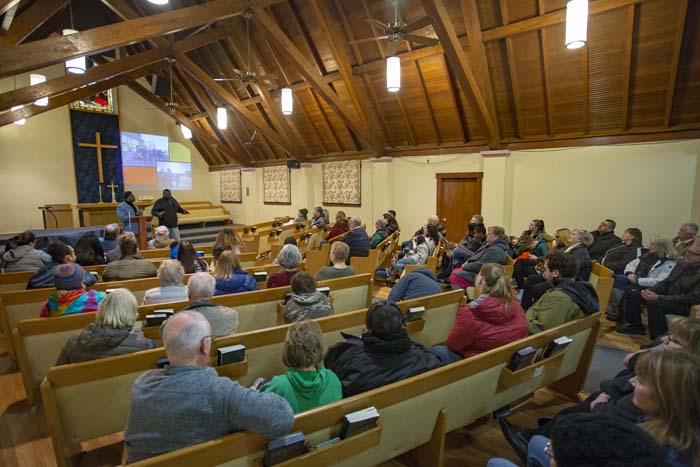Hermiston residents mark MLK holiday with stories of prejudice and progress
Published 1:21 pm Monday, January 20, 2020

- Marchers gather in the Hermiston First United Methodist Church for speeches and food following the annual Martin Luther King Jr. March Monday morning. The march, which celebrated its 20th year this year, drew dozens of marchers to downtown Hermiston in celebration of Martin Luther King Jr. and his legacy.
As participants of this year’s Martin Luther King March in Hermiston gathered at First United Methodist Church afterward to share their thoughts on the civil rights leader’s work, the stories were as varied as the skin tones of the people that filled the pews.
Karen Duffee, who grew up in a small Nevada town with “one single black person,” had to travel to California to get married because her husband was black and she was white.
“We weren’t allowed to get married in Vegas,” she said. “It was illegal.”
They experienced arrest, harassment and violence in retaliation for their interracial marriage, she said.
“We went through a lot of terrible things,” she said. “They painted KKK on our lawn in gasoline, they raided our house, they tried to kill our dogs.”
Jada Rome, Duffee’s granddaughter and a student at Hermiston High School, said no one should think racism is not still present today. She said she was called the N-word by a fellow student just a few weeks ago.
“I’ve been called so many things, I’ve been bullied, I’ve been picked on because I’m black,” she said.
Bernie Sanderson shared an experience from the other side of the coin: She apologetically related to the group that eight years ago she finally met a member of her father’s estranged family and found out that many of her relatives had been active members of the Klu Klux Klan in Ohio.
“I experienced a deep love and respect for my father,” she said. “He ran away when he was 15 years old. From running away from that life, I didn’t have to experience that kind of hate. My mother taught me to love everyone, no matter their race.”
The annual march, now in its 20th year, was hosted by the Hermiston Cultural Awareness Coalition. It started with a “peace walk” through downtown, stopped briefly at city hall for the pledge of allegiance and remarks by a city official, and ended up at the church, where people were invited to share their thoughts.
One commenter shared that when he moved to the United States from Mexico in the 1980s and became friends with a black man, people would assume that the only reason the two of them would hang out together was because they were in a gang. A white man talked about how as a child he always looked up to his black neighbors in Pendleton, who he considered “high class” compared to his family, and was confused about why other white people felt differently.
Despite examples of racism that were shared, many people also stated they feel that the country has made progress since Martin Luther King Jr.’s death. Nicole Thompson said she had recently moved to the area from Portland it meant a lot to her to see so many people “who don’t look like me” showing up to support a march in King’s honor.
Jazmin Avalos was one of several people who encouraged the group to take action so that the country could improve even more in the next 61 years.
“Always start with yourself, and never believe you are small,” she said.
During his address at city hall, city manager Byron Smith said he had been inspired by reading some of King’s lesser-known speeches, including one titled “Unfinished Dreams.”
“So many of us in life start out building temples: temples of character, temples of justice, temples of peace,” King wrote in that speech. “And so often we don’t finish them. Because life is like Schubert’s ‘Unfinished Symphony.’ At so many points we start, we try, we set out to build our various temples. And I guess one of the great agonies of life is that we are constantly trying to finish that which is unfinishable.”
Smith said he agreed that imperfect human beings will never “finish” the work of ending prejudice, but “we can move toward that goal.”
Keynote speaker Roy Barron, a city councilor and local organizer, shared several of King’s quotes on justice and morality, and said his philosophies still hold true today.
“Whether it’s injustice based on race, or injustice based on gender, or injustice based on sexual orientation, injustice anywhere is a threat to justice everywhere,” Barron said.
People fear what they don’t know, he said, so it’s “incumbent on us to be informed and to speak truth to false narratives.”
He said it would have been easy for the men and women who fought for civil rights to feel overwhelmed by the size and power of the institutions they were up against. Instead, they soldiered on.
“They give me hope we will rise to the occasion,” Barron said.




